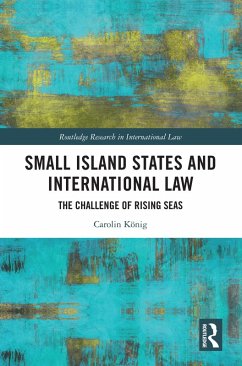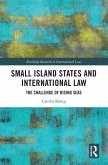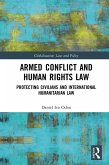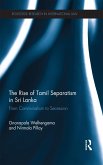42,95 €
42,95 €
inkl. MwSt.
Sofort per Download lieferbar

21 °P sammeln
42,95 €
Als Download kaufen

42,95 €
inkl. MwSt.
Sofort per Download lieferbar

21 °P sammeln
Jetzt verschenken
Alle Infos zum eBook verschenken
42,95 €
inkl. MwSt.
Sofort per Download lieferbar
Alle Infos zum eBook verschenken

21 °P sammeln
- Format: ePub
- Merkliste
- Auf die Merkliste
- Bewerten Bewerten
- Teilen
- Produkt teilen
- Produkterinnerung
- Produkterinnerung

Bitte loggen Sie sich zunächst in Ihr Kundenkonto ein oder registrieren Sie sich bei
bücher.de, um das eBook-Abo tolino select nutzen zu können.
Hier können Sie sich einloggen
Hier können Sie sich einloggen
Sie sind bereits eingeloggt. Klicken Sie auf 2. tolino select Abo, um fortzufahren.

Bitte loggen Sie sich zunächst in Ihr Kundenkonto ein oder registrieren Sie sich bei bücher.de, um das eBook-Abo tolino select nutzen zu können.
What happens under international law if a state perishes due to rising sea levels without a successor state being created? Will the state cease to exist? What would this mean for its population? Have international law and globalization progressed enough to protect the people thus affected
- Geräte: eReader
- mit Kopierschutz
- eBook Hilfe
Andere Kunden interessierten sich auch für
![Small Island States & International Law (eBook, PDF) Small Island States & International Law (eBook, PDF)]() Carolin KönigSmall Island States & International Law (eBook, PDF)42,95 €
Carolin KönigSmall Island States & International Law (eBook, PDF)42,95 €![The Pillars of Global Law (eBook, ePUB) The Pillars of Global Law (eBook, ePUB)]() Giuliana Ziccardi CapaldoThe Pillars of Global Law (eBook, ePUB)50,95 €
Giuliana Ziccardi CapaldoThe Pillars of Global Law (eBook, ePUB)50,95 €![Routledge Handbook of the South China Sea (eBook, ePUB) Routledge Handbook of the South China Sea (eBook, ePUB)]() Routledge Handbook of the South China Sea (eBook, ePUB)44,95 €
Routledge Handbook of the South China Sea (eBook, ePUB)44,95 €![Armed Conflict and Human Rights Law (eBook, ePUB) Armed Conflict and Human Rights Law (eBook, ePUB)]() Daniel Ivo OdonArmed Conflict and Human Rights Law (eBook, ePUB)41,95 €
Daniel Ivo OdonArmed Conflict and Human Rights Law (eBook, ePUB)41,95 €![The Rise of Tamil Separatism in Sri Lanka (eBook, ePUB) The Rise of Tamil Separatism in Sri Lanka (eBook, ePUB)]() Gnanapala WelhengamaThe Rise of Tamil Separatism in Sri Lanka (eBook, ePUB)31,95 €
Gnanapala WelhengamaThe Rise of Tamil Separatism in Sri Lanka (eBook, ePUB)31,95 €![The Law of Consular Access (eBook, ePUB) The Law of Consular Access (eBook, ePUB)]() John QuigleyThe Law of Consular Access (eBook, ePUB)47,95 €
John QuigleyThe Law of Consular Access (eBook, ePUB)47,95 €![Cases and Materials on the Law of International Organizations (eBook, ePUB) Cases and Materials on the Law of International Organizations (eBook, ePUB)]() William Thomas WorsterCases and Materials on the Law of International Organizations (eBook, ePUB)31,95 €
William Thomas WorsterCases and Materials on the Law of International Organizations (eBook, ePUB)31,95 €-
-
-
What happens under international law if a state perishes due to rising sea levels without a successor state being created? Will the state cease to exist? What would this mean for its population? Have international law and globalization progressed enough to protect the people thus affected
Dieser Download kann aus rechtlichen Gründen nur mit Rechnungsadresse in A, B, BG, CY, CZ, D, DK, EW, E, FIN, F, GR, HR, H, IRL, I, LT, L, LR, M, NL, PL, P, R, S, SLO, SK ausgeliefert werden.
Produktdetails
- Produktdetails
- Verlag: Taylor & Francis eBooks
- Seitenzahl: 272
- Erscheinungstermin: 30. Dezember 2022
- Englisch
- ISBN-13: 9781000812053
- Artikelnr.: 66306085
- Verlag: Taylor & Francis eBooks
- Seitenzahl: 272
- Erscheinungstermin: 30. Dezember 2022
- Englisch
- ISBN-13: 9781000812053
- Artikelnr.: 66306085
- Herstellerkennzeichnung Die Herstellerinformationen sind derzeit nicht verfügbar.
Carolin König works as a lawyer in a law firm specializing in energy law. Her personal focus is on international law and the climate policy aspects of energy law. She studied law at the Ludwig-Maximilians-University of Munich and the Katholieke Universiteit Leuven and holds a PhD in international law.
She was a research assistant at the Institute for International Law with a focus on International Human Rights Protection at the University of the German Armed Forces in Munich. She also gained professional experience at the German Foreign Office, in various law firms, including in the field of asylum law, and as legal advisor to the Permanent Mission of the Maldives to the United Nations.
She was a research assistant at the Institute for International Law with a focus on International Human Rights Protection at the University of the German Armed Forces in Munich. She also gained professional experience at the German Foreign Office, in various law firms, including in the field of asylum law, and as legal advisor to the Permanent Mission of the Maldives to the United Nations.
A. Introduction
A Brief Overview of the Science Behind Climate-Change-Induced Rising Sea
Levels
Small Island States, the Rising Seas, and the International Community
The Rising Seas and International Law - Open Questions and How to Find
Answers
B. What does an Entity Need to Qualify as a State? - or What it Takes to be
a State
C. When does a State Cease to Exist? - or What it Takes Not to be a State
Anymore
Loss of Territory
Criterion "A Defined Territory" Endangered by the Rising Seas?
Statehood Endangered by the Loss of "A Defined Territory"?
Examples of Rights and Duties Associated with Sovereignty
Sovereign Action on Foreign Territory
a) Cases of Interventionist Actions on Foreign Territory
b) Cases of Tolerated Actions on Foreign Territory
c) Limitations on Action on Foreign Territory as a Consequence
Other Forms of Sovereignty
Conclusion
Examples of "Statehood" without Territory
Non-Territorial Unions
Sovereign Subjects of International Law without Territory
States that Temporarily Lost their Territory
Virtual States
Conclusion
States' Considerations with Regard to Potential Loss of Territory
Conclusion
Loss of Population
Concluding Thoughts on What it Takes Not to be a State Anymore
D. What it Means to be a State - the Emergence of the Modern State and its
Significance Today
Rights of a Modern State
Challenges for the Contemporary Concept of a State
Humanization - the Increasing Importance of the Individual
Globalization - the Decreasing Importance of Territory?
Concluding Thoughts on What it Means to be a State
E. What it Means Not to be a State Anymore - the Consequences of the Loss
of Statehood for the State's Population and the International Community
Loss of Statehood and its Effects on the Respective Populations -
Individual and Collective Dimension
Nationality and Why Having a State is (Still) Important for the Protection
of Human Rights
Emerging Infringements on the Human Rights of (Indigenous) Peoples from
Small Island States due to Rising Sea Levels
Collective Dimension of Human Rights Infringements due to Climate Change
Conclusion
Loss of Statehood - Triggering a Responsibility of the International
Community?
Human Rights Approach
Responsibility that Comes with Solidarity
Responsibility to Protect
Causal Responsibility
Responsibility of the One Able to Respond
Conclusion
Concluding Thoughts on What it Means Not to be a State Anymore
F. Closing Remarks
A Brief Overview of the Science Behind Climate-Change-Induced Rising Sea
Levels
Small Island States, the Rising Seas, and the International Community
The Rising Seas and International Law - Open Questions and How to Find
Answers
B. What does an Entity Need to Qualify as a State? - or What it Takes to be
a State
C. When does a State Cease to Exist? - or What it Takes Not to be a State
Anymore
Loss of Territory
Criterion "A Defined Territory" Endangered by the Rising Seas?
Statehood Endangered by the Loss of "A Defined Territory"?
Examples of Rights and Duties Associated with Sovereignty
Sovereign Action on Foreign Territory
a) Cases of Interventionist Actions on Foreign Territory
b) Cases of Tolerated Actions on Foreign Territory
c) Limitations on Action on Foreign Territory as a Consequence
Other Forms of Sovereignty
Conclusion
Examples of "Statehood" without Territory
Non-Territorial Unions
Sovereign Subjects of International Law without Territory
States that Temporarily Lost their Territory
Virtual States
Conclusion
States' Considerations with Regard to Potential Loss of Territory
Conclusion
Loss of Population
Concluding Thoughts on What it Takes Not to be a State Anymore
D. What it Means to be a State - the Emergence of the Modern State and its
Significance Today
Rights of a Modern State
Challenges for the Contemporary Concept of a State
Humanization - the Increasing Importance of the Individual
Globalization - the Decreasing Importance of Territory?
Concluding Thoughts on What it Means to be a State
E. What it Means Not to be a State Anymore - the Consequences of the Loss
of Statehood for the State's Population and the International Community
Loss of Statehood and its Effects on the Respective Populations -
Individual and Collective Dimension
Nationality and Why Having a State is (Still) Important for the Protection
of Human Rights
Emerging Infringements on the Human Rights of (Indigenous) Peoples from
Small Island States due to Rising Sea Levels
Collective Dimension of Human Rights Infringements due to Climate Change
Conclusion
Loss of Statehood - Triggering a Responsibility of the International
Community?
Human Rights Approach
Responsibility that Comes with Solidarity
Responsibility to Protect
Causal Responsibility
Responsibility of the One Able to Respond
Conclusion
Concluding Thoughts on What it Means Not to be a State Anymore
F. Closing Remarks
A. Introduction
A Brief Overview of the Science Behind Climate-Change-Induced Rising Sea Levels
Small Island States, the Rising Seas, and the International Community
The Rising Seas and International Law - Open Questions and How to Find Answers
B. What does an Entity Need to Qualify as a State? - or What it Takes to be a State
C. When does a State Cease to Exist? - or What it Takes Not to be a State Anymore
Loss of Territory
Criterion "A Defined Territory" Endangered by the Rising Seas?
Statehood Endangered by the Loss of "A Defined Territory"?
Examples of Rights and Duties Associated with Sovereignty
Sovereign Action on Foreign Territory
a) Cases of Interventionist Actions on Foreign Territory
b) Cases of Tolerated Actions on Foreign Territory
c) Limitations on Action on Foreign Territory as a Consequence
Other Forms of Sovereignty
Conclusion
Examples of "Statehood" without Territory
Non-Territorial Unions
Sovereign Subjects of International Law without Territory
States that Temporarily Lost their Territory
Virtual States
Conclusion
States' Considerations with Regard to Potential Loss of Territory
Conclusion
Loss of Population
Concluding Thoughts on What it Takes Not to be a State Anymore
D. What it Means to be a State - the Emergence of the Modern State and its Significance Today
Rights of a Modern State
Challenges for the Contemporary Concept of a State
Humanization - the Increasing Importance of the Individual
Globalization - the Decreasing Importance of Territory?
Concluding Thoughts on What it Means to be a State
E. What it Means Not to be a State Anymore - the Consequences of the Loss of Statehood for the State's Population and the International Community
Loss of Statehood and its Effects on the Respective Populations - Individual and Collective Dimension
Nationality and Why Having a State is (Still) Important for the Protection of Human Rights
Emerging Infringements on the Human Rights of (Indigenous) Peoples from Small Island States due to Rising Sea Levels
Collective Dimension of Human Rights Infringements due to Climate Change
Conclusion
Loss of Statehood - Triggering a Responsibility of the International Community?
Human Rights Approach
Responsibility that Comes with Solidarity
Responsibility to Protect
Causal Responsibility
Responsibility of the One Able to Respond
Conclusion
Concluding Thoughts on What it Means Not to be a State Anymore
F. Closing Remarks
A Brief Overview of the Science Behind Climate-Change-Induced Rising Sea Levels
Small Island States, the Rising Seas, and the International Community
The Rising Seas and International Law - Open Questions and How to Find Answers
B. What does an Entity Need to Qualify as a State? - or What it Takes to be a State
C. When does a State Cease to Exist? - or What it Takes Not to be a State Anymore
Loss of Territory
Criterion "A Defined Territory" Endangered by the Rising Seas?
Statehood Endangered by the Loss of "A Defined Territory"?
Examples of Rights and Duties Associated with Sovereignty
Sovereign Action on Foreign Territory
a) Cases of Interventionist Actions on Foreign Territory
b) Cases of Tolerated Actions on Foreign Territory
c) Limitations on Action on Foreign Territory as a Consequence
Other Forms of Sovereignty
Conclusion
Examples of "Statehood" without Territory
Non-Territorial Unions
Sovereign Subjects of International Law without Territory
States that Temporarily Lost their Territory
Virtual States
Conclusion
States' Considerations with Regard to Potential Loss of Territory
Conclusion
Loss of Population
Concluding Thoughts on What it Takes Not to be a State Anymore
D. What it Means to be a State - the Emergence of the Modern State and its Significance Today
Rights of a Modern State
Challenges for the Contemporary Concept of a State
Humanization - the Increasing Importance of the Individual
Globalization - the Decreasing Importance of Territory?
Concluding Thoughts on What it Means to be a State
E. What it Means Not to be a State Anymore - the Consequences of the Loss of Statehood for the State's Population and the International Community
Loss of Statehood and its Effects on the Respective Populations - Individual and Collective Dimension
Nationality and Why Having a State is (Still) Important for the Protection of Human Rights
Emerging Infringements on the Human Rights of (Indigenous) Peoples from Small Island States due to Rising Sea Levels
Collective Dimension of Human Rights Infringements due to Climate Change
Conclusion
Loss of Statehood - Triggering a Responsibility of the International Community?
Human Rights Approach
Responsibility that Comes with Solidarity
Responsibility to Protect
Causal Responsibility
Responsibility of the One Able to Respond
Conclusion
Concluding Thoughts on What it Means Not to be a State Anymore
F. Closing Remarks
A. Introduction
A Brief Overview of the Science Behind Climate-Change-Induced Rising Sea
Levels
Small Island States, the Rising Seas, and the International Community
The Rising Seas and International Law - Open Questions and How to Find
Answers
B. What does an Entity Need to Qualify as a State? - or What it Takes to be
a State
C. When does a State Cease to Exist? - or What it Takes Not to be a State
Anymore
Loss of Territory
Criterion "A Defined Territory" Endangered by the Rising Seas?
Statehood Endangered by the Loss of "A Defined Territory"?
Examples of Rights and Duties Associated with Sovereignty
Sovereign Action on Foreign Territory
a) Cases of Interventionist Actions on Foreign Territory
b) Cases of Tolerated Actions on Foreign Territory
c) Limitations on Action on Foreign Territory as a Consequence
Other Forms of Sovereignty
Conclusion
Examples of "Statehood" without Territory
Non-Territorial Unions
Sovereign Subjects of International Law without Territory
States that Temporarily Lost their Territory
Virtual States
Conclusion
States' Considerations with Regard to Potential Loss of Territory
Conclusion
Loss of Population
Concluding Thoughts on What it Takes Not to be a State Anymore
D. What it Means to be a State - the Emergence of the Modern State and its
Significance Today
Rights of a Modern State
Challenges for the Contemporary Concept of a State
Humanization - the Increasing Importance of the Individual
Globalization - the Decreasing Importance of Territory?
Concluding Thoughts on What it Means to be a State
E. What it Means Not to be a State Anymore - the Consequences of the Loss
of Statehood for the State's Population and the International Community
Loss of Statehood and its Effects on the Respective Populations -
Individual and Collective Dimension
Nationality and Why Having a State is (Still) Important for the Protection
of Human Rights
Emerging Infringements on the Human Rights of (Indigenous) Peoples from
Small Island States due to Rising Sea Levels
Collective Dimension of Human Rights Infringements due to Climate Change
Conclusion
Loss of Statehood - Triggering a Responsibility of the International
Community?
Human Rights Approach
Responsibility that Comes with Solidarity
Responsibility to Protect
Causal Responsibility
Responsibility of the One Able to Respond
Conclusion
Concluding Thoughts on What it Means Not to be a State Anymore
F. Closing Remarks
A Brief Overview of the Science Behind Climate-Change-Induced Rising Sea
Levels
Small Island States, the Rising Seas, and the International Community
The Rising Seas and International Law - Open Questions and How to Find
Answers
B. What does an Entity Need to Qualify as a State? - or What it Takes to be
a State
C. When does a State Cease to Exist? - or What it Takes Not to be a State
Anymore
Loss of Territory
Criterion "A Defined Territory" Endangered by the Rising Seas?
Statehood Endangered by the Loss of "A Defined Territory"?
Examples of Rights and Duties Associated with Sovereignty
Sovereign Action on Foreign Territory
a) Cases of Interventionist Actions on Foreign Territory
b) Cases of Tolerated Actions on Foreign Territory
c) Limitations on Action on Foreign Territory as a Consequence
Other Forms of Sovereignty
Conclusion
Examples of "Statehood" without Territory
Non-Territorial Unions
Sovereign Subjects of International Law without Territory
States that Temporarily Lost their Territory
Virtual States
Conclusion
States' Considerations with Regard to Potential Loss of Territory
Conclusion
Loss of Population
Concluding Thoughts on What it Takes Not to be a State Anymore
D. What it Means to be a State - the Emergence of the Modern State and its
Significance Today
Rights of a Modern State
Challenges for the Contemporary Concept of a State
Humanization - the Increasing Importance of the Individual
Globalization - the Decreasing Importance of Territory?
Concluding Thoughts on What it Means to be a State
E. What it Means Not to be a State Anymore - the Consequences of the Loss
of Statehood for the State's Population and the International Community
Loss of Statehood and its Effects on the Respective Populations -
Individual and Collective Dimension
Nationality and Why Having a State is (Still) Important for the Protection
of Human Rights
Emerging Infringements on the Human Rights of (Indigenous) Peoples from
Small Island States due to Rising Sea Levels
Collective Dimension of Human Rights Infringements due to Climate Change
Conclusion
Loss of Statehood - Triggering a Responsibility of the International
Community?
Human Rights Approach
Responsibility that Comes with Solidarity
Responsibility to Protect
Causal Responsibility
Responsibility of the One Able to Respond
Conclusion
Concluding Thoughts on What it Means Not to be a State Anymore
F. Closing Remarks
A. Introduction
A Brief Overview of the Science Behind Climate-Change-Induced Rising Sea Levels
Small Island States, the Rising Seas, and the International Community
The Rising Seas and International Law - Open Questions and How to Find Answers
B. What does an Entity Need to Qualify as a State? - or What it Takes to be a State
C. When does a State Cease to Exist? - or What it Takes Not to be a State Anymore
Loss of Territory
Criterion "A Defined Territory" Endangered by the Rising Seas?
Statehood Endangered by the Loss of "A Defined Territory"?
Examples of Rights and Duties Associated with Sovereignty
Sovereign Action on Foreign Territory
a) Cases of Interventionist Actions on Foreign Territory
b) Cases of Tolerated Actions on Foreign Territory
c) Limitations on Action on Foreign Territory as a Consequence
Other Forms of Sovereignty
Conclusion
Examples of "Statehood" without Territory
Non-Territorial Unions
Sovereign Subjects of International Law without Territory
States that Temporarily Lost their Territory
Virtual States
Conclusion
States' Considerations with Regard to Potential Loss of Territory
Conclusion
Loss of Population
Concluding Thoughts on What it Takes Not to be a State Anymore
D. What it Means to be a State - the Emergence of the Modern State and its Significance Today
Rights of a Modern State
Challenges for the Contemporary Concept of a State
Humanization - the Increasing Importance of the Individual
Globalization - the Decreasing Importance of Territory?
Concluding Thoughts on What it Means to be a State
E. What it Means Not to be a State Anymore - the Consequences of the Loss of Statehood for the State's Population and the International Community
Loss of Statehood and its Effects on the Respective Populations - Individual and Collective Dimension
Nationality and Why Having a State is (Still) Important for the Protection of Human Rights
Emerging Infringements on the Human Rights of (Indigenous) Peoples from Small Island States due to Rising Sea Levels
Collective Dimension of Human Rights Infringements due to Climate Change
Conclusion
Loss of Statehood - Triggering a Responsibility of the International Community?
Human Rights Approach
Responsibility that Comes with Solidarity
Responsibility to Protect
Causal Responsibility
Responsibility of the One Able to Respond
Conclusion
Concluding Thoughts on What it Means Not to be a State Anymore
F. Closing Remarks
A Brief Overview of the Science Behind Climate-Change-Induced Rising Sea Levels
Small Island States, the Rising Seas, and the International Community
The Rising Seas and International Law - Open Questions and How to Find Answers
B. What does an Entity Need to Qualify as a State? - or What it Takes to be a State
C. When does a State Cease to Exist? - or What it Takes Not to be a State Anymore
Loss of Territory
Criterion "A Defined Territory" Endangered by the Rising Seas?
Statehood Endangered by the Loss of "A Defined Territory"?
Examples of Rights and Duties Associated with Sovereignty
Sovereign Action on Foreign Territory
a) Cases of Interventionist Actions on Foreign Territory
b) Cases of Tolerated Actions on Foreign Territory
c) Limitations on Action on Foreign Territory as a Consequence
Other Forms of Sovereignty
Conclusion
Examples of "Statehood" without Territory
Non-Territorial Unions
Sovereign Subjects of International Law without Territory
States that Temporarily Lost their Territory
Virtual States
Conclusion
States' Considerations with Regard to Potential Loss of Territory
Conclusion
Loss of Population
Concluding Thoughts on What it Takes Not to be a State Anymore
D. What it Means to be a State - the Emergence of the Modern State and its Significance Today
Rights of a Modern State
Challenges for the Contemporary Concept of a State
Humanization - the Increasing Importance of the Individual
Globalization - the Decreasing Importance of Territory?
Concluding Thoughts on What it Means to be a State
E. What it Means Not to be a State Anymore - the Consequences of the Loss of Statehood for the State's Population and the International Community
Loss of Statehood and its Effects on the Respective Populations - Individual and Collective Dimension
Nationality and Why Having a State is (Still) Important for the Protection of Human Rights
Emerging Infringements on the Human Rights of (Indigenous) Peoples from Small Island States due to Rising Sea Levels
Collective Dimension of Human Rights Infringements due to Climate Change
Conclusion
Loss of Statehood - Triggering a Responsibility of the International Community?
Human Rights Approach
Responsibility that Comes with Solidarity
Responsibility to Protect
Causal Responsibility
Responsibility of the One Able to Respond
Conclusion
Concluding Thoughts on What it Means Not to be a State Anymore
F. Closing Remarks







